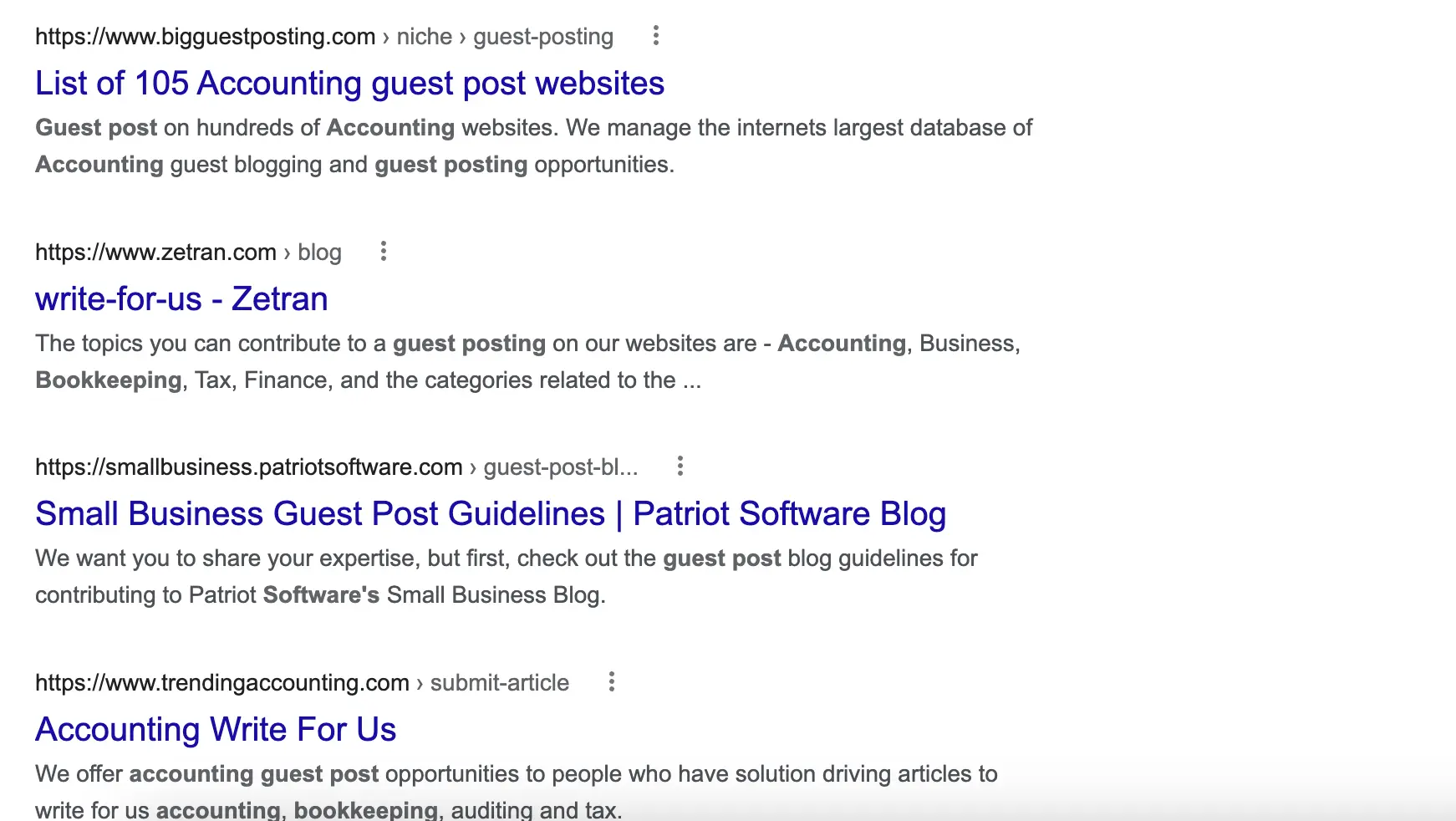As SEO becomes more important, businesses seek more ways to utilize content marketing. Guest posts are now a popular tactic to get backlinks and boost rankings on search engines. Fortunately, there are several guest blogging opportunities in the industry that you can use for your benefit.
If done right, guest blogging can fuel your growth by helping you build brand awareness. But how and where can you look for these opportunities?
This article will examine the best methods to find guest blogging opportunities, the benefits of using this form of content marketing, some free guest posting sites, and best practices.
What is Guest Blogging?
There are over 600 million blogs out of 1.9 billion websites globally. While some blogs have content from the owners, others get blog posts from external writers. Guest blogging, or guest posting, is a content marketing strategy that involves publishing your content on someone else’s website.
You can write a post and then send it to another authoritative website within your target niche to publish it. For example, you can submit your article to business, health, and technology blogs or digital news sites. When your article gets published, it can include your byline, or in some cases, it will be written “contributor” or “guest author.”
Marketers engage in guest posting for these reasons:
- To get more brand awareness among your audience
- To drive traffic back to own website (referral traffic)
- Provide backlinks for ranking purposes
Guest blogging is a strategy for people looking for backlinks to boost their rankings on Google Search. Because of this, it’s a popular white-hat SEO tactic for most marketers. You’ll get non-monetary benefits, including a link to your social media profile or website.
How to Find Guest Blogging Opportunities?
To become a guest blogger, you first need to find these opportunities. Next, you need to find blogs and websites that accept guest posts. These sites should be relevant to your niche and a good fit for your budget, strategy, and availability. For instance, if you just launched a new charging device, you will want to find tech blogs with an engaged audience.
Here are some tactics to help you find guest posting opportunities.
1. Conduct a Google Search
The first place to spot opportunities is Google. You can get anything on Google Search using the right keywords. Most websites and blogs that accept guest posts have a specific page that outlines guidelines for guest authors. Therefore, you can start by searching using specific keywords to find the blogs.
Some of the keywords to search include:
- Write for us
- Submit an article
- Guest article
- Guest post
- Contributing writer
- Become a contributor
- Guest column
- Writers Wanted
- Guest post opportunities
For instance, if your business specializes in accounting software, your Google search can be “accounting software guest post.”

You can combine all the results in a spreadsheet and analyze them later to find high-quality websites.
2. Follow the Blog
The blog or website you choose will publish your content for their audience; therefore, you need to understand their readers. Analyze the blog to determine the content they like and what content keeps them engaged to help you tailor your posts. Interacting with this content will be helpful when sending a pitch for a guest post.
Read a few blog posts and identify what stands out. From this, you can also understand the format to help as you draft your blog post. In addition, you should also pay attention to the broad topics. For instance, if most content is how-to guides or tutorials, your blog post should take the same direction.
Apart from the blog posts, you can subscribe to their newsletter. Most marketers send out exclusive content to their followers and subscribers. Such newsletters will give you an idea of what format and style to use on your guest post.
Furthermore, you should use social media to get more details about the target website and company. Follow their social media pages on Twitter and LinkedIn to see what the audience is interested in. You can use this information to pitch for a guest post.
3. Study Profilic Guest Bloggers
Every industry has prolific guest bloggers. Therefore, you will likely find some renowned names if you read websites and blogs in your niche. According to statistics, 60% of bloggers write 1 to 5 guest posts monthly. This means that you can find them if you do your research properly.
For instance, if you are in marketing, some influential guest bloggers include Neil Patel, Kevin Rowe, Jeff Bullas, and Tony Right. You can start by checking the type of posts they publish. A simple search on Google will bring up some of their guest contributions on different sites that can act as a starting point.
Alternatively, you can use social media to get these bloggers. Most will promote their guest blog posts on their social media pages to drive traffic. Use these links to find their articles on different websites. Additionally, if you know some of the guest bloggers in your industry in person, you can talk to them to make an introduction to your target blog owners.
4. Check Competitor Backlinks
Your competitors can also be a good source of information. You can use their backlinks to find guest blogging opportunities. Use a tool like SEMRush or Ahrefs to check their backlinks profile and identify recent links from guest posts. Therefore, if a company accepts a guest blog post from your competitor, there’s a high chance they might be interested in your pitch too.
Alternatively, you can use Google Search to see the sites your competitor writes for. Most of these sites might be good quality and relevant to your industry, making them a good fit. With this information, you can start sending pitches to the respective blogs.
5. Use Social Media

Social media platforms like Twitter make finding sites accepting guest bloggers easy. You can use the search feature on Twitter and type “write for us” or “guest post” to get options. This is an excellent strategy to get these websites because guest posting sites also promote their latest content on social media.
The advantage of using platforms like Twitter and LinkedIn over Google Search to search for guest posting opportunities is that the results are more recent. Therefore, you’ll find guest bloggers and sites that are active. To get recent posts, check the “latest” section or use the “people” feature to find other bloggers. Follow these guest bloggers to see their work.
Here are the other functions you can carry out on social media platforms like Twitter.
- Create alerts in your niche to learn new opportunities as soon as they get promoted.
- Check the competitor’s social media feed for any new guest posts.
- Use the same search terms and keywords as on Google.
Although you might not find the same quality or volume of results on social media, it’s an excellent opportunity to find some sites and other bloggers.
6. Networking
To get more guest posting opportunities, you need to network with other professionals in the digital marketing industry. Find ways to connect with propel in a similar industry, especially guest bloggers and blog owners. Social media, niche forums, and blog comment sections are some of the ways to network.
Share their work, leave comments, and have conversations to create a rapport. For instance, if you send a connection request on LinkedIn, you can send professional, friendly messages and start interacting with their posts on the platform.
Additionally, there are multiple online communities that you can join on Reddit, LinkedIn, Facebook, or Slack. Guest bloggers share some of their posts on these communities; finding potential platforms is an excellent opportunity. Once you join the community, actively participate in discussions to earn trust and develop relationships.
This tactic establishes a relationship, making it easier to engage when asking them about a guest post. A blog owner or blogger is more likely to respond to you if you’ve interacted before.
How To Become a Successful Guest Blogger?
To become successful in guest posting, you need a proper strategy. Here are some of the key things to pay attention to.
1. Understand Your Goals
Before you begin guest posting, you must understand your goal. Once you have this in mind, you can determine the blog to submit to. Selecting topics to write about is more manageable when you have measurable and attainable goals. This also allows you to evaluate whether this strategy is ideal for your business.
Some of the objectives could be:
- Boosting search visibility
- Improving referral traffic
- Getting more clients and leads
- Getting your name out as an expert in the field
- Making money as a guest blogger
- Improving SEO performance
- Getting high-quality backlinks from authoritative websites
Goals around SEO traffic, backlinks, and referral visits can be easily tracked. You can use these metrics to determine if you achieved your goal.
2. Brainstorm Blog Post Topics
Whether you are a newbie or a seasoned blogger, you should be prepared with a few topics as you pitch. Remember that the content should tie back to your website; therefore, you must pay attention to your chosen topic.
To brainstorm topics, check the guest site and social media pages to see the type of content they focus on. You can get a topic idea by identifying what’s missing. You can also read their social media pages and take note of the common audience queries. Alternatively, you can use their best-performing content and build on that success or find an alternative angle.
Once you have this information, you can make a short list of potential topics and strategize how to send the pitches. Ensure that the topics align with the specific website to increase your chances of acceptance.
For every targeted website, pick a relevant topic for you and the readers. You can then use keyword research tools like Ahrefs to boost your ideas.
3. Prepare to Pitch
To improve your chances of getting positive feedback, you should prepare your pitch in advance. Here are some things you need to pay attention to as you prepare.
4. Understand the Blog’s Content
Before you send the pitch, you must know the target audience. You need to confirm the type of audience they write for, whether they are beginners or advanced, and the article format. For instance, if the blog’s audience is primarily businesses, your content should be tailored for B2B. In addition, if most articles are listicles, you should also work on a similar piece.
5. Check Other Guest Posts on The Site
If you plan to write for a site that accepts multiple guest posts, you should check the performance of these posts. Confirm if the guest posts have comments or have been shared on social media. If the audience only interacts with the publisher’s content, you might not get stellar results, especially if your goal is to get traffic back to your website.
6. Find Out Which Blog Posts Perform Well
To increase your chances of getting approved, you need to check the topics on the site. It could work if you pitch topics that do well with the audience. Once you identify the popular topics, you can use them to tailor your content.
7. Check The Other Guest Bloggers
Every blog owner prefers the type of content and bloggers they need. For instance, you might find that the publishing site prefers content from marketers, consultants, and freelancers. Go through the available blogger bios to see what the contributors do. This information is important and handy when it’s time to introduce yourself to the blog owner. Your guest blogging strategy should involve gathering all the necessary information.
8. Join Blogging Communities
If you are new in the business, joining a blogging community can increase your chances as a guest blogger. You can get recognition from a blog owner if you comment on these forums, especially their latest posts. Additionally, you can share some of their posts on social media and tag them to establish a relationship.
9. Read the Guidelines
If you check most guest sites, you’ll see a guest post submission page. This section includes the submission criteria for the blog posts. To avoid rejection, you need to read these guidelines and follow them to the letter. For instance, some sites will indicate that they only accept finished drafts or ask you to complete a form. Others might also ask for a pitch you must send before drafting the article.
Some of the common guidelines include
- The article format
- Font styles
- Image requirements
- How to submit the draft or final article
To dodge potential hiccups, it’s advisable to read these guidelines before contacting the blog owner. It makes the submitting process more manageable.
10. Send a Pitch
Once you understand the guidelines, you can start drafting the pitch. This outreach process will be successful if you use all the information you’ve gathered, such as keywords and popular topics. Your pitch should be warm and friendly to increase your chances of getting a response from the website owner.
In your pitch, you must also show that you’ve researched the website and the value your content will bring. You can also mention similar blog posts published on the site to connect with the recipient. If you are contacting several blogs, you can use outreach tools to make the process more seamless.
As you send the pitches, ensure you have a system to track the responses. You can use worksheets or tools like Respona that automatically track all responses. Ensure the emails are brief, precise, and personalized to make them easy to read.
11. Follow Up or Get Accepted
If your submission goes well, you might get accepted. However, if you fail to get a response, you can follow up with the editor or blog owner after a week. Send a brief and friendly message, and avoid being too pushy. You can refresh the editor about the idea if you send two follow-up emails without any response. However, if you don’t get an answer after a while, consider other options.
12. Draft the Post

Once your pitch and topic are accepted, you can start writing the post. If you are an expert in the field, you can draft it. However, you can hire an editor to review the draft, even if you are an experienced writer. Statistics show that 87% of bloggers develop guest post ideas themselves, but only 52% of these bloggers actually write the posts.
If you are uncomfortable, you can hire extra help to ensure the article is well done. An editor will also provide feedback to help you improve the article. Here are some key elements you must consider while writing a guest blog.
- Pay attention to SEO optimization.
- Content should be at least 1,000 words
- Break the content into paragraphs
- Link the content to other published posts
- Link the post to your own relevant posts
- Add original images and infographics
- Hyperlink authoritative statistics and facts from other sites
- Link to other articles on the publisher’s site
- Add a byline
- Research keyword phrases
When the first draft is complete, include your full name, social media pages, a short bio, a headshot, and a link to your website. This information allows readers to connect with you. It also leads them back to your content, especially if your goal is to drive traffic.
13. Promote Your Work
Although the publishing site will promote the post on their channels, you also need to promote it on your pages as well. Use social media pages like LinkedIn, Facebook groups, and Twitter to publicize these posts.
Ensure that you tag the guest posting site. This will allow them to reshare and promote you to more followers. Promoting your work is a good idea because it showcases it to potential clients. Therefore, you should leverage your social media profiles if you want more clients for your business.
14. Track Your Posts
This is one of the most important steps of guest blogging. Once your post is published, you must track it and check whether you hit your goals and milestones. For instance, if your objective is to improve your SEO, you can check the metrics to determine whether the strategy has worked.
Tools like Ahrefs can help you check the organic traffic performance, the number of backlinks, referral traffic, and the keyword ranking for your website.
Benefits of Guest Blogging
Guest blogging has some benefits and drawbacks. Let’s take a closer look at them.
1. To Grow your Audience
Most bloggers want to get introduced to a new audience. Your blog or website has its own followers; therefore, posting on another site allows you to grow your audience. You’ll get more readers if published on a website with a large readership. Additionally, these new readers will be redirected to your website or social media pages.
2. It Builds Relationships
If you are a new company or just started a new website, guest blogging is handy for building relationships. You can reach out to prolific bloggers and more prominent organizations with your content, giving you more opportunities. Once you get published on several sites, you can interact with similar guest bloggers in your niche.
3. It Gets You More Leads
Guest blogging gets you more leads, especially if your content is engaging. Readers will follow the links to your blog to find more information. Therefore, if you are promoting a new product or service, this could increase your sales conversions.
4. It Could Earn You an Income
Some guest bloggers get paid for their writing. Therefore, if this is your guest blogging goal, you should only pitch to sites that pay writers for content.
5. It Builds Your Profile
If you want to build your name in the industry as a professional or thought leader in the niche, you can use guest blogs to achieve this. Once you contribute to several sites, you can build a portfolio that showcases your guest posting work to potential clients and industry peers. Therefore, if you are new in the industry, you can use this strategy to elevate your career.
6. Free Backlinks
Once you guest post on another site, you earn free backlinks to your website. This is an advantage if your goal is to drive traffic to your website.
7. It Improves Brand Awareness
You can use guest posting to drive brand awareness if you have a new product or service. You can easily achieve this by posting your content on a high-authority site with more readers.
8. It Grows Social Media Following
You can grow your social media following by using guest blogging. Your article should include your social media profiles that the reader can use to view your page. Additionally, once the publisher shares your content on their page, your work will be visible to more people. You might get more views, likes, mentions, and followers from one interesting blog post.
9. It Improves SEO Performance
Maintaining the quality of guest posting is crucial for SEO. If your goal is to boost your rankings on search engines, you could achieve this and improve your SEO performance by sharing your own content on another website.
For your SEO strategy to be effective, provide helpful, genuine, and relevant content to educate the audience. If you provide low-quality content for link-building, it could come off as spam, ultimately hurting the business.
However, having high-quality content and backlinks signals Google that your website content is interesting and relevant. Therefore, when readers share, like, or comment on the blog post, it moves up Google’s page ranking. This means that it will be among the top results when someone searches for related keywords and topics.
Ensure your blog posts are not too crammed with keywords and links because Google can’t tell the difference between spam and dynamic content. If you fail at this, the site won’t generate any new traffic, and your site will not be ranked as an authority in your niche.
10. It Drives New Partnerships
Once you build your profile as an expert in your niche, this could bring in new partnerships, job offers, and co-marketing opportunities. Therefore, if you want to partner with other brands, boost your visibility in the industry by crafting guest blog posts.
Best Practices For Guest Blogging
Although your primary focus is to create engaging content, you still need to do a little more to succeed. Here are the key best practices that you need to keep in mind.
1. Create a Captivating Author Bio
As a guest blogger, you need an author bio for your pitch and articles. A good bio will establish your writing credentials and build trust with the blog owner. The bio is the only place you can add self-promotion links to your products and services.
Here are the key things to include:
- Link to your website: If your goal is to get backlinks to your site, ensure that your bio includes some links with a target anchor text.
- Include links to your own site or social media profile to showcase your other work. This guest blogging strategy is ideal if your plan is to increase the number of followers on your social media pages. You can do this by adding something like “Follow me on (social media network and link) to the end of your bio.
- A custom landing page: If the objective is to get more traffic, you should consider having a custom landing page to direct traffic. You can send the readers to a specific product or service or your home page, depending on your goals.
- A description of your work: Your bio should include background information about your work. You should include your level of experience to show why you are a qualified guest post. In addition, consider adding some of the current projects or recent articles to spark interest among the readers.
For instance, if the publishing site only takes content from other bloggers, you must introduce yourself as a blogger and include your business or personal blog. This increases your chances of getting the job. Additionally, if your goal is to build your profile in the niche, your bio can give the audience more details about you.
2. Don’t Ignore The Guidelines
As mentioned; all the guest posting sites provide specific guidelines that every writer should follow to write for them. As a best practice, follow the procedures as you submit your pitch or first draft. For instance, if the owner requests you to create a WordPress account to present the content, you should follow these guidelines.
To avoid any delays, it’s advisable to check out this section of the website before reaching out to the blog owner.
Remember, failing to follow the set standards might lead to rejection.
3. Personalize The Messages
Statistics show that when the email subject lines are personalized, the open rates increase by 50%. Therefore, if you want to get your request to the blog owner, ensure that you personalize your communication efforts.
Remember that blog owners receive hundreds of emails weekly, so you must find a way to stand out. For instance, you can differentiate yourself by avoiding starting an email with “Hi,” “Dear Webmaster,” “ or “Dear Sir or Madam.” Since you already know the owner’s name, you should use their name and contact information.
You can easily find this information on social media profiles like Twitter and LinkedIn. Take time and research to find the right emails to ensure you communicate with the right person. During your research, you should also get information about the job title, and recent projects and mention this in the email body to keep them hooked.
4. Build Links
Before sending out any content or pitch, ensure you have several links from your site. If you must submit a draft, include some links in the piece. You can also add links from the host’s website and other related platforms. However, avoid adding too many of them; this might put you at risk of Google penalties.
5. Monitor The Posts
To determine whether your guest blogging venture is successful, closely monitor your performance. Like any other content, you want to see how your website metrics have changed during this period. Start by checking the comments on the blog and confirm the number of shares, likes, and views. If your metrics have improved, you can use this guest blogging strategy for subsequent content.
6. Share Your Content
Once your content is published on a guest site, you still need to share it with others. To grow traffic and build your profile, ensure the blog post is shareable. You can post on your social media pages for your audience. Additionally, if it’s shareable, the readers can post the content on their pages to extend your reach.
7. Be Responsive
To build long-lasting relationships; you need to be responsive. Your guest blogging strategy will be more successful if you respond to messages as soon as you get them. Once you email a blog owner, you should stay ready for feedback. Blog owners will also be receptive to new pitches if you quickly respond to messages.
After your content is published, you can talk to the blog owner to allow you to subscribe to comments on the guest post. You’ll receive an email alert when anyone comments on the blog post. Alternatively, you can track the shares and mentions of the guest blog via a Google alert.
Additionally, if the blog owner mentions you on social media to share your blog post, you should respond to comments. The more responsive you are, the easier it is to connect with a new audience. This will help you meet your goals, especially to grow your followers.
8. Pitch To Multiple Sites Simultaneously
Many blog owners will ignore or miss your pitch because they receive multiple guest post pitches daily.
The owner might need more time to respond to your pitch. Because of this, pitching to multiple sites is safer to increase your chances of getting published. You should find multiple sites and pitch to them simultaneously during your research.
For instance, you should pitch to at least 5-10 sites if you want to publish one guest post. It’s better to get approvals from multiple sites is better than not getting one. This allows you to choose one option that aligns with your goals and fits your audience.
You can contact the blog owner, marketing manager, editor, content director, or the person responsible for the blog. For the best results, include details about who you are, why you are the best person to guest post on the site, and the topic you want to write about.
What is the Best Time to Pitch For Guest Posts?
Although there’s no specific time to pitch a guest post, there are some opportunities that you can take advantage of. If you send your pitch on these occasions, you will likely get feedback from the blog owner or editor. Here are some of the best times to pitch for guest posts.
When A Website Advertises
Guest posting sites will often advertise that they are looking for guest posts. They can do this via their official website or social media profiles. If you want to start guest posting, look out for such advertisements. As you research, you can follow the publishing sites on social media to see the alerts as soon as they come out.
Additionally, you can use the forums and guest blogging communities to look out for these opportunities. Some companies might share their advertisements in such forums.
If You are Mentioned in One of The Posts
You can pitch for a guest post if the target blog mentions you on social media or on one of their posts. For instance, if the publishing blog shares some content on LinkedIn and tags you as an expert on the matter, you should take advantage of this opportunity and apply for a chance to guest post on their website.
When Your Business or Product Is Mentioned
You should consider sending a pitch if a website mentions your product or business in an industry article. This shows that they know your brand and work, making it easier to approach them with a request for a guest post.
When The Website Publishes A Guest Post
You can pitch for a guest post once the website publishes an article from another writer. You can use this as an opportunity to showcase your work. If the website accepts guest posts from others, there’s a high chance they will take in more writers. Research the common topics and writing styles from recent guest posts and tailor your pitch based on this information.
Free Guest Posting Sites
If you want to start guest posting, here are some sites you can pitch to.
- Outbrain
- Social Media Examiner
- Copyblogger
- HubSpot
- TechCrunch
- Medium
- Mashable
- The Muse
- GetResponse
- Creative Bloq
- Search Engine Land
- MarketingProfs
- Search Engine Watch
- Business Insider
Conclusion
Guest blogging is a critical component of the marketing strategy.
If you want to boost traffic to your site, grow the number of your followers, or boost referral traffic, you can use this content marketing strategy to your advantage.
There are many guest blogging opportunities for marketers and writers if you search on Google, social media, blogging communities, and competitor backlinks.
You can rely on guest blogging as an SEO tactic as long as you use high-quality links in your content. With a proper guest blogging strategy, you can boost your rankings on search engines and extend your reach.
Guest Blogging FAQs
Does Guest Blogging Still Work?
Yes, guest posting still works. It’s a critical part of any marketing strategy and can be used as an effective SEO strategy to increase organic traffic. However, getting guest blogging opportunities is much harder than before because blog owners must go through multiple mediocre guest pitches daily.
However, suppose you follow the best practices of a good pitch. In that case, you can get approved by multiple blog owners and enjoy the benefits of guest blogging, such as increased referral traffic, exposure to new readers, new partnerships, and increased backlinks.
Is Guest Blogging Paid?
Most guest blogging opportunities are not paid. Website owners generally don’t pay because guest posting has countless benefits; therefore, most marketers are willing to do it without earning any income. Guest blogging is free press, allowing you to get more clients without spending a lot of money marketing.
However, you might get paid for your guest posts if you work for reputable publications and magazines. Therefore, to increase your income through guest posting, you should only send pitches to website owners who offer such an arrangement. You can generate profit from guest posting and use this income to boost your marketing budget and get more leads for your products and services.
How Many Guest Posts Should I Write?
You should focus on quality, even if your main goal is to get your name out there. Contributing to a few quality websites is better than writing hundreds of low-quality content. You should avoid spammy blogs and provide your content only to the target market.
Additionally, you shouldn’t burn yourself out due to guest posting. Draft a few posts and build a portfolio to gain more work.
Does Google approve guest posting?
Although Google has penalized some sites and posts before, it allows guest posting as long as content and links are on topic. This is why it’s important to avoid keyword stuffing and to add too many links to your content; otherwise, Google will classify your blog post as spammy. You can post on different sites, and Google will rank your content without any problem.
How Long Should Guest Blogs Be?
An ideal guest post should be between 500 and 1,000 words. However, you can lengthen it to 2,500 words. The length of the article largely depends on the specific publisher. You’ll see instructions about the required word count on the writing guidelines. You can check this blog section or look at published guest posts to see the average word count.









